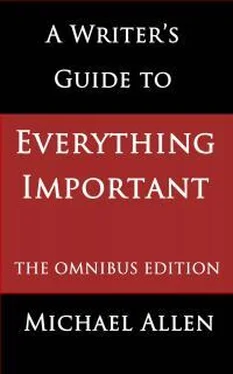In this part of the book I am going to describe a number of well known cases. I do so not just because of the juicy scandalous nature of the stories but because they provide instructive examples for the inexperienced writer of just how badly things can go wrong. You really do want to avoid similar disasters if you possibly can.
3.1 Villainy begins early
Writers and agents, we may safely assume, began to have disputes and disagreements pretty much from the beginning, but the first recorded thief in this area was a certain A.A. Bright.
Bright specialised in drama rather than books, and J.M. Barrie was an enormously successful playwright (most famous today for the character Peter Pan). In 1906, perhaps overwhelmed by his financial problems, Bright committed suicide. And shortly before his agent’s death Barrie was privately informed that Bright had defrauded him of £18,000; other clients had lost similar sums.
In 1906, £18,000 was a huge sum of money. In 1939, my parents were able to by a perfectly good family house for £800. Barrie, however, must have been a forgiving soul, for when Bright died he wrote a generous eulogy in The Times. He was, wrote Barrie, ‘a man of the mind most catholic and cultured… of so beautiful and modest a nature… For many years he was my most loved friend.’
But then, of course, Barrie was definitely a bit peculiar.
3.2 The case of Harper Lee
It is easy for someone my age to assume that you are bound to know who Harper Lee was, but of course you may not. I will be as brief as possible.
Harper Lee wrote one novel, and one novel only. Its title was To Kill a Mockingbird. It won the Pulitzer Prize in 1961, and was turned into an Oscar-winning film, one which earned $20 million on a $2 million budget. In short, To Kill a Mockingbird is a classic of modern American literature.
From the point of view of the book’s income-generating power, it is important to note that it has been widely used as a set book in schools and colleges. Thus it has continued to sell in huge numbers for over fifty years: usually about 750,000 copies a year.
We now know, because of the data provided in court papers, that in one typical six-month period, ending in December 2009, Harper Lee’s royalties amounted to $1,688,064 and change. And the agent, we may reasonably assume, was on 15% of that.
Ms Lee had a number of agents over the years, but she was principally represented by McIntosh and Otis. Eventually, the man she dealt with there was one Samuel Pinkus. Lee seems to have trusted him totally.
About ten years ago, Pinkus left M&O to found his own agency, and Lee went with him. Harper Lee is now in her late eighties and in 2007 suffered a stroke.
To cut a long story short, Lee’s family and friends began to suspect that Pinkus had taken advantage of her age and her absolute trust in him. They discovered that, knowingly or not, she had signed a document which gave the entire copyright in her famous work to her agent. He owned the entire book, and therefore much of the income from it (depending on previous contracts).
Not surprisingly, the friends and family set about hitting Mr Pinkus with as heavy a legal brick as they could find, and one can hardly blame them.
If you want to read the full details of this case go to To Steal a Mockingbird? by Mark Seal. This is an article which appeared in Vanity Fair in 2013, and it is still available online.
The article is, I believe, well worth your attention, because it fully demonstrates that, because of the workings of randomness, not to mention their own devious scheming, some agents end up representing gold mines. And if they are not fully honest and reliable, the situation can get very messy and stressful; not to mention expensive in legal fees.
In September 2013, a lawyer for Pinkus announced that the warring parties (Lee and Pinkus) had reached an agreement in principle to settle the dispute between them. So let us hope that the wrongs have been put right, and that this frail old lady can live out the rest of her days in peace.
In her prime, Harper Lee certainly had no doubts about the way things were going. Her first agent was Maurice Crain, and when Crain died, in 1970, Lee realised that the old way of agenting had gone with him.
By the late 1980s, she was complaining that the literary business was a whole new ball game. Agents like Crain had been replaced by whippersnappers, whose only concern, she said, was their commission. Pity she wasn’t a bit quicker to spot what Pinkus was up to, but by then she had had a stroke.
3.3 Martha Grimes
Martha Grimes is not as big a name as Harper Lee, but she is the author of 22 mystery novels, plus a number of other books. In 2012 she won the Grand Master Award from the Mystery Writers of America.
In 2010, Martha found herself being sued by her former agent, Peter Lampack. Note the word former.
Lampack stated that he had negotiated a contract for Grimes which contained an ‘option’ clause. This kind of clause is very common – almost universal – and it gave Grimes’s publisher, Penguin, the right to have the first opportunity to publish her next book. As it happened, they did want to publish her next one. Lampack argued that he was therefore entitled to his commission on the second book, even though he was no longer Martha Grimes’s agent when Penguin actually bought the book.
In November 2010 Lampack lost the argument. A New York Supreme Court Judge dismissed most of his lawsuit. And I should hope so too. Cheeky bugger, that Lampack.
Ms Grimes no longer uses an agent, as such. Instead, her lawyer negotiates for her.
‘I’m sure there are some good agents out there,’ says Grimes. ‘I just don’t know who they are.’
Yup, they can be hard to find, that’s true.
Grimes has got her own back by writing a novel which takes the piss (as we say in the UK) out of the publishing industry in general and agents in particular. It’s called The Way of All Fish , and it sounds like fun.
3.4 The Asimov affair
Isaac Asimov (1920-1992) is another well known name, at least if you’re of a certain age and are interested in science fiction. I, Robot is perhaps his most famous work: the film starred Will Smith and made a lot of money.
By any standards, Asimov was a remarkably prolific writer. He wrote, or edited, some 500 books on a wide variety of subjects, though concentrating on science. It is said that his books are listed in libraries under nine out of the ten major subject categories in the Dewey decimal system.
While he was alive, Asimov seems to have acted as his own agent, and according to come sources he was an absolute pushover in negotiations. When he sold what was to be his 262nd book to Doubleday, he accepted terms which any midlist author could have improved upon, and the firm had to more or less bully him into taking a $50,000 advance. He wanted $5,000. Well, maybe there were tax reasons; on both sides.
Anyway, with a track record like that it is obvious that after his death the estate would require some professional handling, and the family (daughter Robyn and widow Janet) appointed the Trident Media Group as agents.
Early in 2013 the relationship went sour, and the family tried to terminate the contract. The estate wanted a judge to declare the relationship over, and to require the trident Media Group to pay $1 million in damages for its ‘deceptive business practices’.
Four days later, they got a letter from TMG’s lawyer, which rejected the estate’s assertions and declared that the agreement was not terminated. So there, see.
Watch this space. At he time of writing this is not resolved.
Читать дальше












